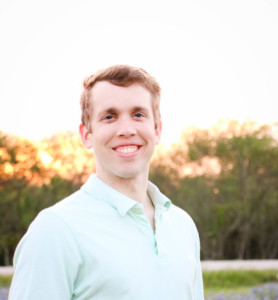PRAIRIE VIEW, Texas (August 3, 2021) – Assistant Professor Logan Yelderman, Ph.D., typically begins his classes at Prairie View A&M University (PVAMU) with a story. They are usually relevant to his lectures in psychology, such as how scorpion venom affects ion channels in the brain or how sharks use mechanoreceptors to determine the fat content of a bite of prey. But his students also report that their favorites involve his experiences with a variety of creatures – from snakes to scorpions, tarantulas and raccoons.
Dr. Yelderman often tells stories about the animals he has found around his house, including how he once chased off a coyote trying to eat his chickens, and how he trapped and released a dozen raccoons that were going to extraordinary ends to find food. To help students become aware of dangerous snakes, Dr. Yelderman also is a wealth of knowledge for his students about which of the common Texas snakes are venomous, and which ones will likely bite a person who gets near them or tries to pick them up.
He finds that these stories engage students and help them relax – it opens the door to them enjoying their experience in a research lab or helping them overcome their fear of research, he says.
“These stories are also great class starters,” Dr. Yelderman said. “They immediately grab the students’ attention and stimulate their interest and focus on the subsequent content presented in class.”
Although his expertise is relevant for many students studying in the Department of Psychology, his classes focus on experimental psychology, forensic psychology, physiological psychology, social psychology and health psychology. In each of these, his philosophy for teaching anchors his classes: developing students into independent researchers.
“One of my favorite things about teaching is using the hands-on experience in my research lab to teach students the research process,” Dr. Yelderman said. “In my research lab, undergraduate students work with me, and several graduate students, to assist in conducting research. Several of these students have gone on to present research at a conference, publish in a scientific journal, and many have gone on to graduate school. It is quite special to watch students take a weakness or fear and turn it into a strength or a pivotal aspect of their success.”
Equipped with a Passion for Research
After joining PVAMU’s faculty in 2016, Dr. Yelderman has published 15 peer-reviewed journal articles and two encyclopedia entries so far. He is currently co-authoring a book on problem-solving courts with Oxford University Press and co-editing a book on the psychology of legal decision-making with Cambridge University Press.
He has also been awarded the PVAMU Faculty Research Development grant and received funding from the American-Psychology and Law Society, Texas A&M Energy Institute. Most recently, a grant of his submitted to the National Science Foundation was recommended for funding. His research is centered primarily on juror and parole board decision-making and the role of religious fundamentalist beliefs in legal decision-making.
Stemming from an undergraduate degree in communications and psychology and a graduate degree in interdisciplinary social psychology, Dr. Yelderman pursues a wide variety of research projects. However, since his undergraduate studies, he has always been interested in understanding how people make decisions in the legal setting and what, if any, personal and situational characteristics influence these decisions.
Combining his experiences in studying the psychology of religion as an undergraduate student and legal decision-making as a graduate student, he put the two together to understand the influences of religion on legal decision-making. His recent focus includes an assessment of how morals play a role in legal decision-making.
Passing His Passion to His Students
As Dr. Yelderman’s research continues, he encourages his students to keep asking questions and challenging them to dig deeper into their experience at PVAMU, especially when presented with an opportunity for hands-on learning.
“Teachers are guides,” Dr. Yelderman reflected. “I hope to help students develop the ability to problem-solve on their own and approach a problem with confidence they will be able to present a solution or contribute to one.”
As students encounter real-life situations in their research and learning, Dr. Yelderman says he enjoys watching them develop and experiment.
“In-class experiments almost always provide memorable and demonstrative learning experiences,” he said.
Despite a difficult year for most students, Dr. Yelderman said that even learning remotely due to COVID-19 was a reminder for him how much value students bring to the classroom simply by feeling comfortable in it and feeling like it is a space where they can contribute their ideas.
Fitting the PROfile
PVAMU has historically been a university where students of all backgrounds can find a place to put down academic roots, leading them to strong pathways of success, development, careers, and fulfillment. Many faculty, students and alumni have praised the university’s faculty for their roles in their development, both professionally and personally, sometimes by just being an encouraging and supportive figure as they try different educational avenues.
As Dr. Yelderman knows, sometimes all it takes is one conversation to shift a student’s perspective, even if that conversation begins with a story about a scorpion.
“I find tremendous value in being able to discuss topics and issues with students. I always have young thinkers in class who are eager to learn and want to communicate their ideas,” Dr. Yelderman said. “These discussions are always rewarding because, through them, students reveal their original thoughts and ideas, which inevitably include brand new viewpoints each semester. Class discussions are what I enjoy the most.”
By Meredith Mohr
-PVAMU-

